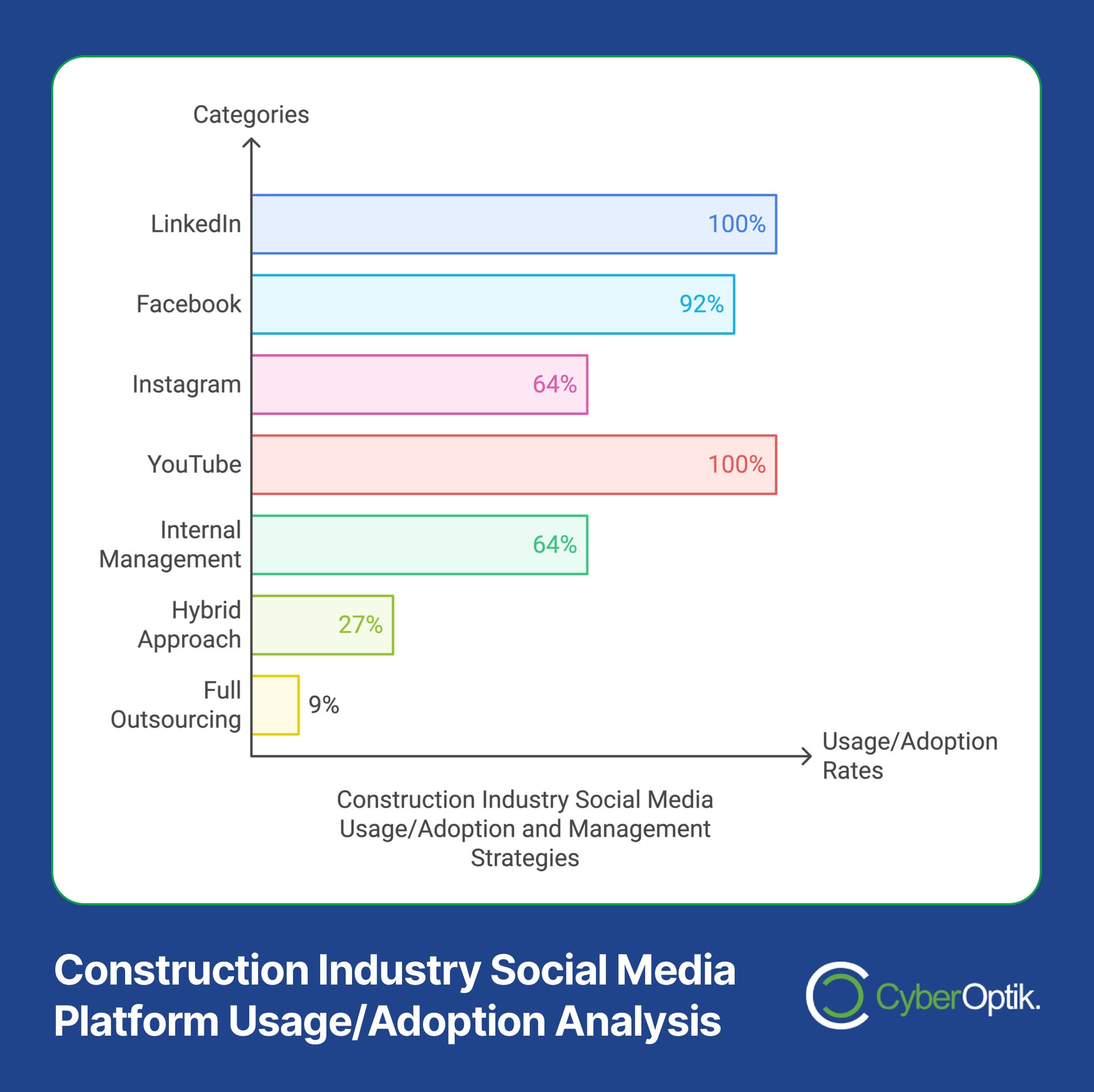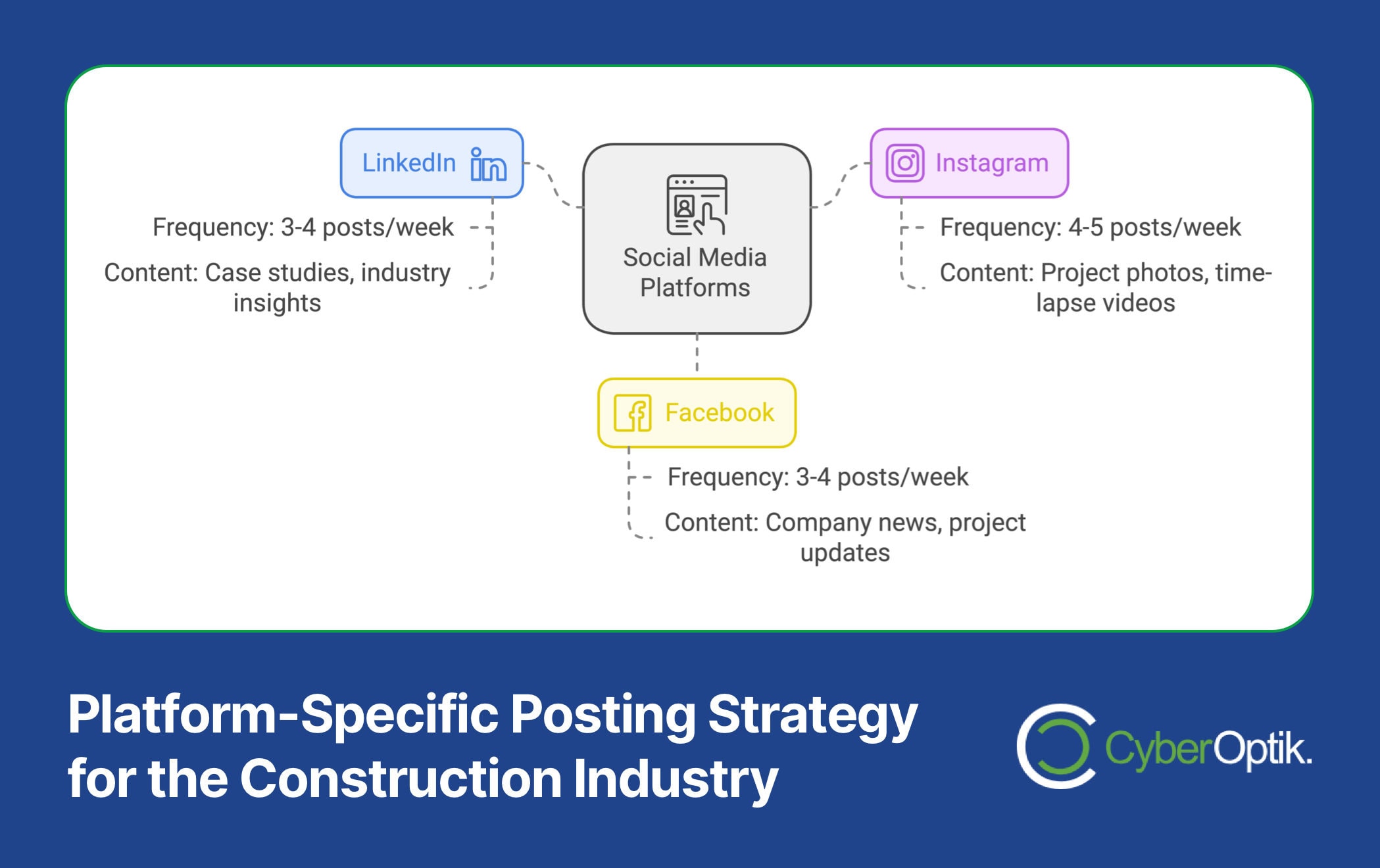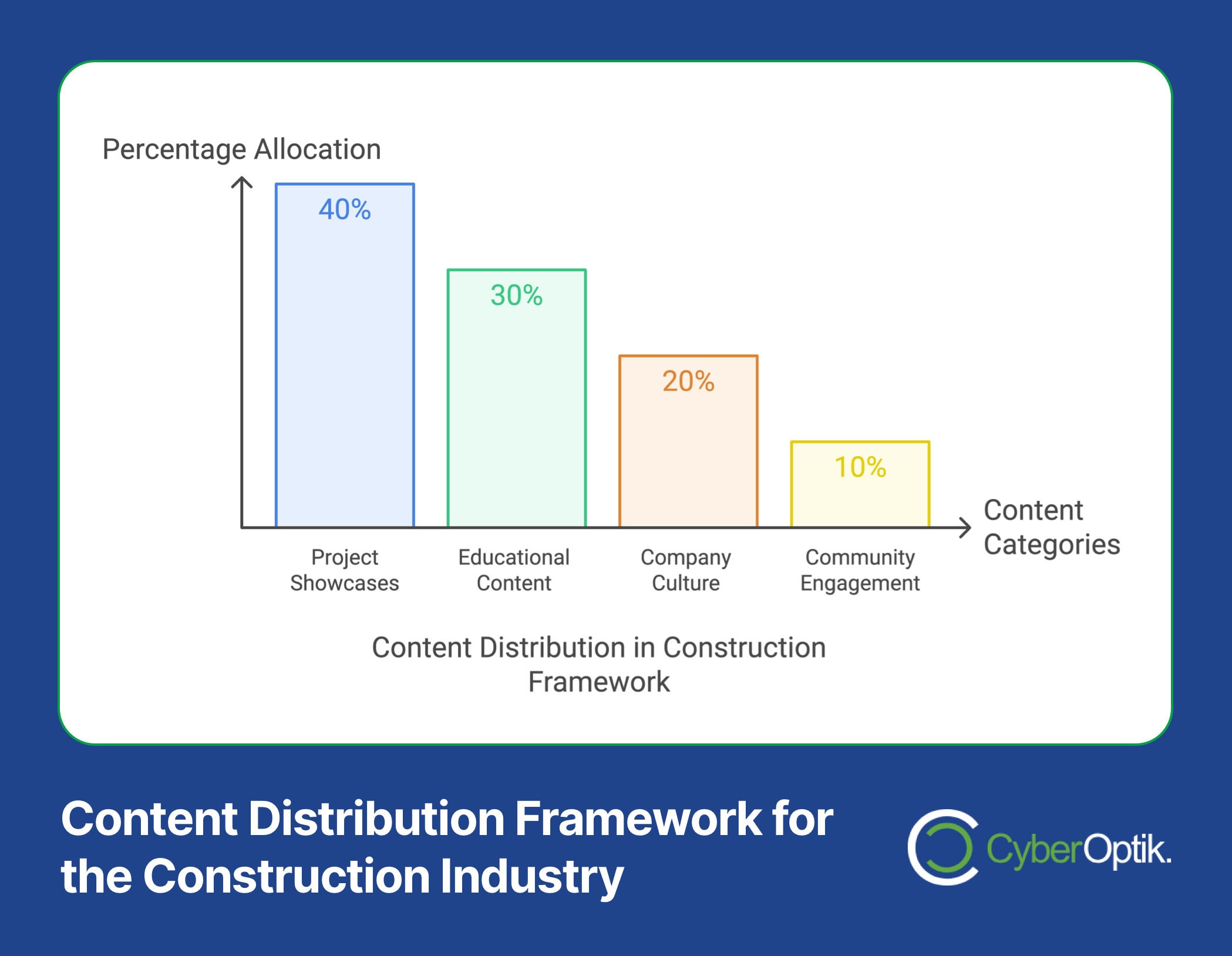Construction companies leveraging social media effectively are seeing up to 36% increases in website traffic.
While every construction professional now uses social media marketing, the gap between high-performing companies and those struggling to gain traction continues to widen. The difference lies not in presence alone, but in the strategic application of proven social media marketing techniques.
The construction industry has embraced social media marketing with remarkable enthusiasm – It seems crazy, but according to the Construction Marketing Association 100% of construction professionals (presumably, of those who were surveyed) now incorporate social media into their marketing programs. However, the results vary significantly. While 45% of companies achieve substantial brand awareness growth, others struggle to generate meaningful engagement and leads. This disparity creates both a challenge and an opportunity for construction companies ready to elevate their social media strategy.
- The Current Social Media Landscape in Construction
- Core Social Media Strategies for Construction Companies
- Platform-Specific Strategies for Construction Companies
- Content Strategy Development
- Measuring Success and Optimization
- Frequently Asked Questions
For construction companies, social media offers unique advantages that traditional marketing channels cannot match. The visual nature of construction work aligns perfectly with platforms like Instagram and LinkedIn, where project progress, finished results, and behind-the-scenes content can showcase craftsmanship and expertise. This visual storytelling capability has transformed how construction companies build trust and demonstrate competence to potential clients. Check out some examples of effective visual marketing strategies in our guide to social media advertising examples.
Beyond visibility, social media provides construction companies with unprecedented opportunities for direct engagement with architects, contractors, potential clients, and industry peers. This networking capability has become increasingly valuable in an industry where relationships and reputation drive business growth. Companies that master social media marketing often find themselves with a significant competitive advantage, as demonstrated by the success stories featured in our showcase of top construction websites.
The strategies we’ll explore in this guide have been proven effective across various construction sectors, from residential builders to commercial contractors. These approaches focus on three core areas: building brand awareness, generating qualified leads, and establishing industry authority. Each strategy has been selected based on documented success in the construction industry, with clear implementation steps and measurement criteria.
Whether you’re just starting to develop your social media presence or looking to optimize existing efforts, these strategies will help you create a more effective social media marketing program. We’ll examine platform-specific techniques, content creation approaches, and measurement methods that align with construction industry best practices and current market demands.

The Current Social Media Landscape in Construction
Construction companies are diversifying their social media presence across multiple platforms to maximize reach and engagement. Recent industry data shows that LinkedIn, Twitter, and YouTube lead platform adoption, with Facebook following at 92% and Instagram at 64% (Construction Marketing Association). This multi-platform approach reflects the industry’s recognition that different social media channels serve distinct marketing objectives.
Platform Usage and Effectiveness
Each social media platform offers unique advantages for construction companies. LinkedIn excels in professional networking and B2B lead generation, while Instagram’s visual focus makes it ideal for showcasing project progress and finished work. Understanding these platform-specific strengths has become crucial for construction marketers, as demonstrated in our analysis of social media ads design psychology.
YouTube has emerged as a particularly powerful platform for construction companies, ranking as the most effective social network for achieving results in the architecture, engineering, and construction (AEC) industry. This effectiveness stems from the platform’s ability to showcase complex projects, demonstrate expertise, and provide valuable educational content to potential clients.
| Platform | Usage Rate | Primary Benefits |
|---|---|---|
| 100% | Professional networking, B2B leads | |
| 92% | Community engagement, brand awareness | |
| 64% | Visual storytelling, project showcasing |
Paid advertising strategies have also evolved, with Facebook and LinkedIn emerging as the preferred platforms for construction companies’ paid social campaigns. This investment pattern aligns with these platforms’ targeting capabilities and professional audience reach.
Management Approaches and Resources
The management of social media marketing in construction reveals interesting patterns about industry priorities and resource allocation. Most construction companies (64%) handle their social media marketing internally, while 9% outsource it entirely, and 27% employ a hybrid approach combining internal and external expertise. This distribution reflects the industry’s growing recognition of social media’s strategic importance while acknowledging the need for specialized skills in certain areas.
Success in construction social media marketing increasingly depends on combining industry expertise with digital marketing knowledge. Companies achieving the best results typically demonstrate both deep construction industry understanding and sophisticated social media marketing capabilities, as seen in our showcase of leading commercial construction websites.
Resource allocation varies significantly across companies, but successful organizations typically invest in three key areas: content creation, audience engagement, and performance analysis. This comprehensive approach ensures that social media efforts align with broader marketing objectives and deliver measurable results. Companies that excel in social media marketing often maintain a consistent presence across platforms while adapting their content and engagement strategies to each platform’s unique characteristics.
Core Social Media Strategies for Construction Companies
Successful social media marketing in construction relies on three fundamental pillars: compelling visual content, strategic audience engagement, and systematic lead generation. Companies that excel in these areas consistently outperform their competitors, with data showing that top performers achieve up to 36% increased website traffic and 18% higher lead generation rates.

Visual Content and Project Showcasing
Visual storytelling forms the cornerstone of effective construction social media marketing. The most successful companies document their projects through multiple stages, creating a compelling narrative that demonstrates expertise and craftsmanship. This approach goes beyond simple before-and-after photos to include progress updates, behind-the-scenes insights, and technical explanations that educate and engage potential clients.
Professional photography and video content have become essential tools in the construction company’s social media arsenal. High-quality visual content should capture key project milestones, showcase innovative construction techniques, and highlight unique project features. For inspiration on creating engaging visual content, explore our guide to effective social media advertising examples.
Essential Visual Content Types:
- Project progress documentation
- Aerial photography and drone footage
- Team expertise demonstrations
- Safety practice showcases
- Innovation and technology highlights
Audience Engagement and Community Building
Engagement strategies in construction social media must balance professional authority with approachable communication. Successful companies create two-way conversations with their audience, responding promptly to comments and messages while maintaining a professional tone that builds trust and credibility. This approach helps transform social media followers into engaged prospects.
Community building extends beyond client interaction to include industry networking and partnership development. Construction companies should actively engage with architects, suppliers, and industry professionals to create a robust professional network. This networking approach can lead to valuable partnerships and referral opportunities, as outlined in our article on creative social media business strategies.
Lead Generation and Brand Awareness
Converting social media engagement into tangible business opportunities requires a structured approach to lead generation. Successful construction companies implement a multi-step process that nurtures social media connections through the sales funnel. This process begins with valuable content sharing and gradually progresses to more direct business development activities.
| Strategy Phase | Key Activities | Expected Outcomes |
|---|---|---|
| Awareness Building | Regular project updates, industry insights, company news | Increased visibility, follower growth |
| Engagement Development | Interactive content, Q&A sessions, expert tips | Higher engagement rates, community growth |
| Lead Conversion | Case studies, client testimonials, project showcases | Qualified leads, consultation requests |
Brand awareness strategies should focus on establishing your construction company as an industry authority. This involves sharing educational content, demonstrating technical expertise, and highlighting successful project outcomes. Companies that consistently share valuable insights and maintain a professional image typically see higher engagement rates and more qualified leads.
To maximize the effectiveness of these strategies, construction companies should maintain a consistent posting schedule and monitor engagement metrics closely. Regular analysis of content performance helps identify which types of posts resonate most with your audience, allowing for continuous refinement of your social media strategy.
The key to successful implementation lies in maintaining authenticity while showcasing expertise. Share real project challenges and solutions, celebrate team achievements, and demonstrate your company’s commitment to quality and safety. This transparent approach builds trust with potential clients and strengthens relationships with existing ones.
Platform-Specific Strategies for Construction Companies
Each social media platform offers unique opportunities for construction companies to showcase their work and engage with different audience segments. Understanding and leveraging these platform-specific characteristics is crucial for maximizing your social media marketing effectiveness.
LinkedIn for Professional Networking
LinkedIn stands out as a crucial platform for construction companies, particularly for B2B relationships and professional networking. With 45% of construction companies investing in LinkedIn advertising, the platform has proven its value for industry-specific marketing. Learn more about maximizing your social media advertising impact in our guide to comprehensive paid social strategies.
Successful LinkedIn strategies for construction companies focus on establishing professional authority and building valuable industry connections. Your company page should serve as a hub for industry insights, project updates, and professional achievements. Regular posting of technical content, project milestones, and industry analysis helps position your company as a thought leader in the construction sector.
LinkedIn Content Strategy Framework:
- Share detailed project case studies with measurable outcomes
- Post industry insights and market analysis
- Highlight team certifications and professional achievements
- Engage with industry groups and discussions
- Showcase company culture and team expertise
Instagram for Visual Storytelling
Instagram’s visual-first approach makes it ideal for showcasing construction projects and demonstrating craftsmanship. The platform’s emphasis on high-quality imagery and short-form video content allows construction companies to create compelling visual narratives that capture attention and build brand recognition.
Understanding the psychology behind visual content can significantly improve your Instagram performance. Our analysis of social media ads design psychology reveals how visual elements influence audience engagement and decision-making.
| Instagram Feature | Content Type | Best Practices |
|---|---|---|
| Feed Posts | Project photos, team highlights, completed work | High-quality images, consistent branding, detailed captions |
| Stories | Behind-the-scenes, daily updates, quick tips | Regular updates, interactive elements, authentic content |
| Reels | Time-lapse construction, how-to content, project reveals | Dynamic editing, educational value, trending audio |
Facebook for Community Building
Facebook remains a powerful platform for construction companies, with 64% of companies investing in Facebook advertising. The platform’s diverse features and broad user base make it excellent for community engagement and local market penetration.
Effective Facebook strategies combine organic content with targeted advertising to reach both residential and commercial clients. The platform’s sophisticated targeting options allow construction companies to reach specific demographics, locations, and interest groups relevant to their services.
Key elements of a successful Facebook strategy include:
Content Mix: Maintain a balanced content calendar that includes project updates, educational content, company news, and community involvement. This variety helps keep your audience engaged while demonstrating different aspects of your company’s expertise and values.
Community Engagement: Actively respond to comments and messages, participate in local business groups, and share content that highlights your company’s involvement in community projects. This engagement helps build trust and establish your company as a valued community member.
Paid Advertising: Utilize Facebook’s advertising platform to reach specific audience segments with targeted messages. Focus on showcasing completed projects, client testimonials, and special offers to generate qualified leads.
The key to success across all platforms lies in maintaining consistency while adapting content to each platform’s unique characteristics. Regular monitoring of engagement metrics helps refine your approach and ensure your social media efforts contribute to your business objectives.
Content Strategy Development
A well-planned content strategy forms the foundation of successful social media marketing for construction companies. The key lies in creating valuable, engaging content that resonates with your target audience while showcasing your expertise and project capabilities.
Effective Content Types
Construction companies need to leverage various content formats to maintain audience engagement and demonstrate their expertise comprehensively. Each content type serves specific objectives in your overall marketing strategy. For insights on creating engaging content, explore our guide on website content tips that can be adapted for social media.
| Content Type | Purpose | Engagement Value |
|---|---|---|
| Project Updates | Showcase progress and expertise | High visual impact, demonstrates capabilities |
| Educational Content | Establish authority and provide value | Builds trust, encourages sharing |
| Behind-the-Scenes | Humanize brand, show processes | Creates connection, shows transparency |
The most effective content strategies incorporate a mix of these formats while maintaining consistent brand voice and messaging. Learn more about developing your brand’s unique voice in our article on creating your business voice.

Content Planning and Calendar
Successful content delivery requires systematic planning and organization. A well-structured content calendar ensures consistent posting while maintaining content quality and relevance. Consider these essential elements when developing your content calendar:
Strategic Content Distribution: Plan your content mix to maintain audience interest while achieving specific marketing objectives. A balanced approach might include:
- 40% Project showcases and updates
- 30% Educational and industry insights
- 20% Company culture and team highlights
- 10% Community engagement and news
Content creation should focus on delivering value while maintaining professional standards. High-quality visuals, accurate technical information, and clear messaging are essential for building credibility in the construction industry.
Content Creation Best Practices:
When developing content, focus on authenticity and expertise. Share real project challenges and solutions, demonstrate your technical knowledge, and highlight your team’s capabilities. This approach builds trust while showcasing your company’s strengths.
Key considerations for content creation include:
Visual Quality: Invest in professional photography and video equipment or services. Construction projects offer excellent opportunities for compelling visual content, from groundbreaking ceremonies to completion reveals.
Technical Accuracy: Ensure all technical information is accurate and current. This includes project specifications, safety standards, and industry regulations. Accuracy in technical content demonstrates expertise and builds trust with professional audiences.
Storytelling Elements: Transform project updates into engaging narratives that highlight challenges overcome, innovative solutions implemented, and client satisfaction achieved. This approach makes technical content more accessible and engaging for diverse audiences.
To maintain content quality and consistency, establish clear guidelines for:
- Brand voice and tone
- Visual standards and photography guidelines
- Technical information verification processes
- Response protocols for comments and messages
Regular content audits help ensure your strategy remains effective and aligned with business objectives. Monitor engagement metrics, audience feedback, and lead generation results to refine your approach continuously. This data-driven approach helps optimize content strategy for maximum impact and ROI.
Measuring Success and Optimization
Effective social media marketing requires consistent measurement and optimization to ensure your efforts generate meaningful results. Understanding key performance metrics and implementing data-driven improvements helps maximize return on investment for your social media activities.
Key Performance Metrics
Success in social media marketing for construction companies can be measured through various metrics that align with specific business objectives. For a comprehensive understanding of marketing ROI measurement, review our analysis of digital marketing ROI versus traditional marketing.
| Metric Category | Key Indicators | Business Impact |
|---|---|---|
| Engagement | Likes, comments, shares, saves | Content effectiveness, audience interest |
| Reach | Impressions, follower growth, post reach | Brand awareness, market penetration |
| Conversion | Click-through rates, lead forms, inquiries | Lead generation, business opportunities |
Optimization Techniques
Continuous improvement in social media performance requires systematic optimization across multiple areas. Focus on these key optimization strategies:
Content Optimization: Analyze engagement patterns to identify which content types resonate most with your audience. Pay attention to:
- Post timing and frequency
- Visual content performance
- Caption length and style
- Call-to-action effectiveness
Audience Targeting: Refine your targeting approach based on engagement data and audience insights. This includes adjusting content themes, messaging, and promotional strategies to better align with audience preferences and behaviors.
Platform Strategy: Regularly evaluate the performance of each social media platform to ensure you’re investing resources effectively. This may involve adjusting your platform mix or reallocating resources based on performance data.
Frequently Asked Questions
Which social media platform is most effective for construction companies?
According to industry research, LinkedIn and YouTube show the highest effectiveness rates for construction companies, with huge adoption rates among industry professionals. However, the best platform for your company depends on your specific goals, target audience, and resources.
How often should construction companies post on social media?
Posting frequency should balance consistency with content quality. A general guideline is: – LinkedIn: 3-4 times per week – Instagram: 4-5 times per week – Facebook: 3-4 times per week Adjust these frequencies based on your engagement metrics and content creation capabilities.
What type of content performs best for construction companies?
Visual content showcasing project progress, completed work, and behind-the-scenes insights typically generates the highest engagement. Educational content about construction processes and industry insights also performs well, especially on professional platforms like LinkedIn.
How can construction companies measure social media ROI?
Track key metrics including: – Lead generation numbers – Website traffic from social media – Engagement rates – Conversion rates – Brand awareness metrics Compare these against your social media investment to calculate ROI.
Should construction companies handle social media in-house or outsource?
The decision depends on your resources and expertise. Currently, 64% of construction companies manage social media internally, while 27% use a hybrid approach combining internal and external expertise. Consider your team’s capabilities, available time, and budget when making this decision.
Final Thoughts: Successful social media marketing for construction companies requires a strategic approach combining platform-specific tactics, consistent content creation, and regular performance optimization. By implementing these proven strategies and continuously measuring results, construction companies can build a strong social media presence that generates meaningful business results.




